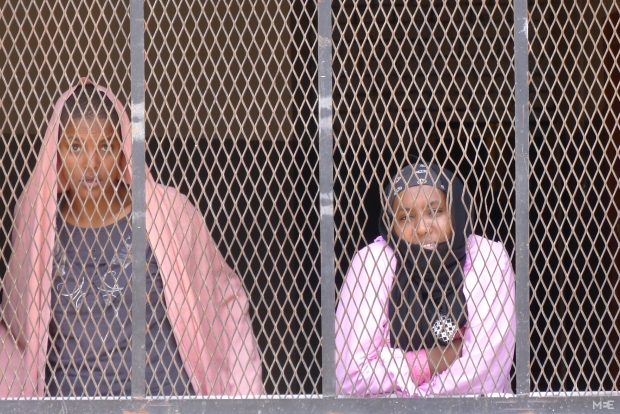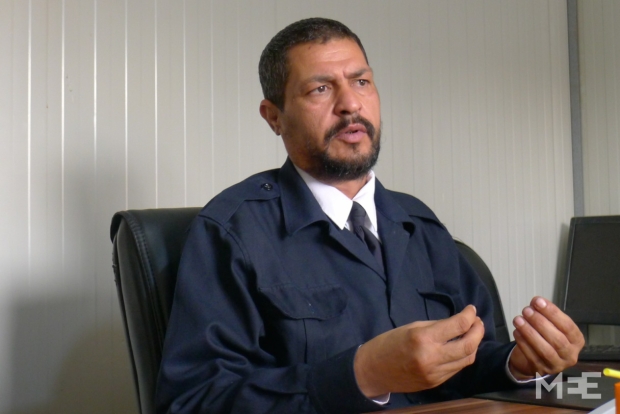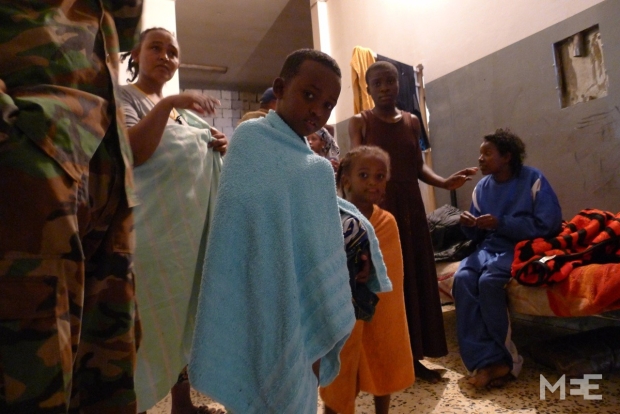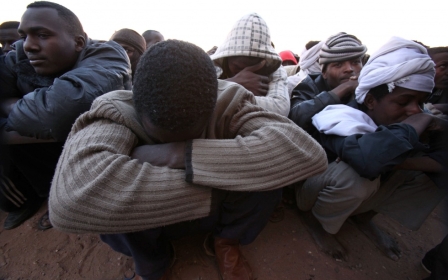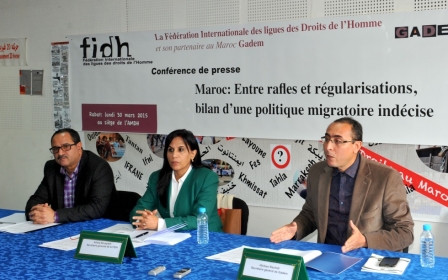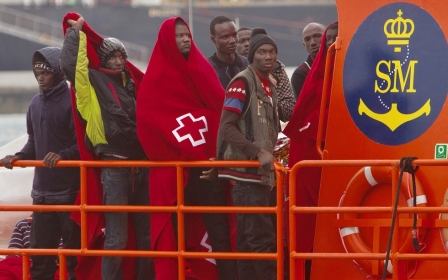Driven mad: Inside a Libyan detention centre for female migrants
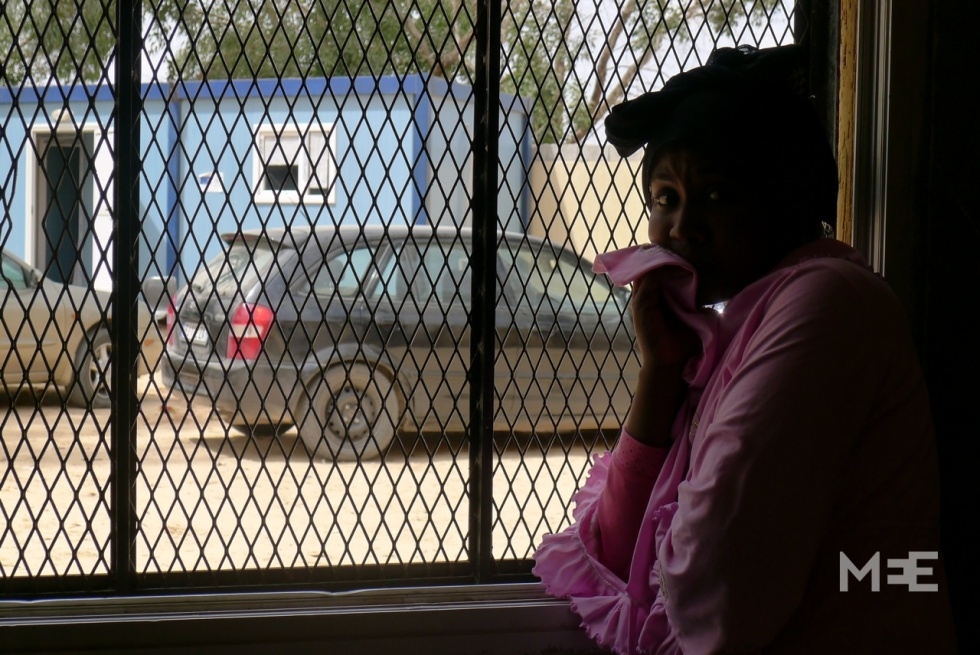
TRIPOLI - Two women gaze out through the broken grill covering one of the windows of the Sorman Detention Centre for illegal immigrants. They are among seven long-term detainees who arrived in Libya in search of a better life but instead found themselves incarcerated in a dank prison which eventually drove them mad.
“This is Aiy Girma. She is Ethiopian and psychologically ill,” said Mohamed, a detention centre guard, speaking through a green paper mask worn by staff when they enter the centre to protect against diseases they claim many of the women carry.
Medical treatment was not available, the Sorman Detention Centre head, Colonel Ibrahim Al-Mahjoubi, told Middle East Eye. Last year, when there was still some modest budget available, he used to take sick women to a private local clinic because the state hospital refused to treat them, fearing they carried diseases of the blood.
“The last hospital bill was LYD 1,700 ($1250) and I can’t do it anymore because there is no money,” Mahjoubi said. “I even deliver babies here myself because there is no money to pay for help. There was no-one else to do it and because I’m in charge, I did it.” He has helped deliver 10 babies at the centre. When he enters the prison, he is the only staff member who does not wear a mask, and some of the women even call him Baba.
“The most important thing we need is a small clinic here at the detention centre, so we can do blood tests and offer basic treatment,” he said. “We could then help detainees and make it feel less like a prison for them.”
‘There is no funding’
There is little prospect of this becoming a reality. Housing 156 women and 11 children, the Sorman Detention Centre is one of 20 overcrowded facilities in Libya that are chronically underfunded and in dire need of supplies and financial support. “There is no funding,” Mahjoubi said. “The government only pays for food and security here and this does not cover the costs of many essentials.”
Three of the most profoundly mentally ill women sleep in the windowless corridor of the centre. In five adjacent rooms, detainees are organised according to their nationality, when they arrived and via a hierarchy that has developed amongst majority and minority groups.
The most recent arrivals to the centre when MEE visited in recent weeks were 103 women and children rescued from a sinking vessel which started filling with water after a day at sea. They huddled side by side on mattresses on the floor in three dark rooms, where untiled sections of wall were discoloured with mould.
Aatifa was amongst 361 people who climbed aboard the ancient, overcrowded fishing vessel from Zawia, 45 kilometres west of Tripoli and one of multiple launching points on the Libyan coast for migrant boats hoping to reach European shores.
Before the sea voyage, it took her a month to reach Libya overland from her war-torn home of Eritrea. “There is a network,” she said. “There is one head in Sudan and another in Libya. We had to pay them both.” Aatifa said she didn’t know how much the overland journey, paid for by her mother, had cost. Other women had paid $1,000 each for the unsuccessful attempt to cross the Mediterranean.
Like a highway to Europe
As the peak season for migrants braving the dangerous Mediterranean crossing in fishing vessels was now underway, the Sorman Detention Centre was expecting more new arrivals. Already over-capacity, Mahjoubi said more women arriving would further stretch the already limited resources. “With six neighbouring countries, Libya has become like a highway for Sub-Saharan Africans to get to Europe,” he said. “The main focus should be on educating these women on the risks of going to sea and trying to reduce attempts to take these boats.”
The international community should also invest in local initiatives in the vulnerable sub-Saharan countries, he said, to give local people more incentive to stay in their home countries. “There is a woman here with three kids and they had nothing in Ethiopia and she said it was a case of survive or die,” he said. With many embassies in Tripoli closed since the outbreak of civil war in the capital last August, he said deportation had become increasingly challenging and the family had been there for over a year.
“I never planned to get the boat,” said Sandra, from Nigeria, standing in one of the lighter rooms, tiled and lined with single beds. “I was working in Tripoli for over a year when they caught me. They came to my house and arrested me, although I had done nothing wrong.” She admitted, however, that she was working in Libya illegally.
“This place is no good, we have no free movement and they treat the women here like goats,” she said. “They have no respect for women and we don’t always have privacy when we are naked.”
Sarah complained that the daily rations of food and seven-litre bottles of water to be shared between four or five people were also insufficient for their needs.
‘We want to go home’
Other Nigerian women, lying in rows of single beds - the mattresses and blankets provided by international aid organisations and distributed by local NGOs - hid their faces. “We want to go home,” one shouted from under a blanket. Another, held in the centre for nine months, complained that detainees’ families had not been contacted and had no idea what had become of them.
Mahjoubi urged the EU to send aid direct to the centre and asked for international organisations to visit Sorman to see the real need, first hand. At present, he said, any money given by NGOs is filtered through so many government departments or different NGOs, the centre saw virtually nothing of any aid. Libya’s civil war, however, has limited the scope of international organisations to be able to work on the ground.
The International Organisation of Migration (IOM) still works on modest voluntary repatriation programmes for migrants in Libya, from its relocated headquarters in Tunisia. Libya’s Department for Combating Illegal Immigration continues to deport small numbers of migrants across the southern borders. But these operations are being held back by Libya’s financial problems and unstable security situation.
For migrants such as Sarah, who say all they want is to go home, it is a journey that is not likely to be made soon.
New MEE newsletter: Jerusalem Dispatch
Sign up to get the latest insights and analysis on Israel-Palestine, alongside Turkey Unpacked and other MEE newsletters
Middle East Eye delivers independent and unrivalled coverage and analysis of the Middle East, North Africa and beyond. To learn more about republishing this content and the associated fees, please fill out this form. More about MEE can be found here.


